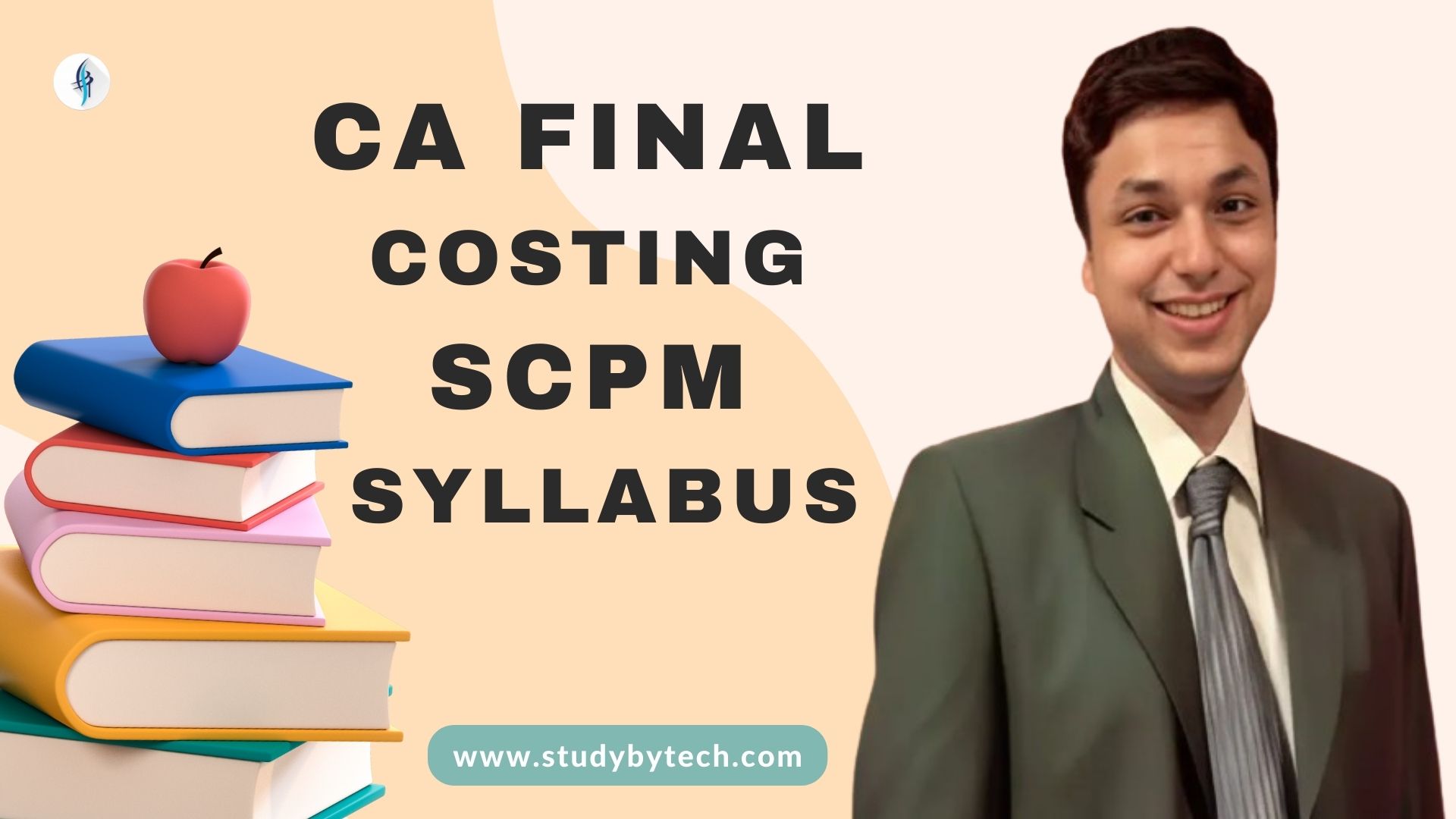CA Final SCPM is actually SPOM set B subject which students have to pass before actually appearing for CA Final exams. These exams are MCQ based and are to be given in exam centres.
MODULE 1(CA Final SCPM): STRATEGIC COST MANAGEMENT
Objective
To acquire the ability to apply various cost management techniques for planning and controlling
performance in order to set, monitor and control strategic objectives.
bTo develop skills of analysis, synthesis and evaluation in cost management to address challenges and
issues that might affect or influence the management of performance within organisations.
PART A
| 1 STRATEGIC COST MANAGEMENT | An Introduction to Strategic Cost Management Managing Cost Strategically: Strategic Cost Management, Limitations of Traditional Cost Management: Traditional vs. Strategic Cost Management |
| ii Organizational Context: Gaining Competitive Advantage, Value Proposition, Osterwalder’s Business Model Canvas iii External Environment Context: Industry Profitability, Basis of Competition, Industry Key Success Factors, Understanding Customers and Markets iv Information Technology: Strategic Context- (IS/IT) and Porter’s Five Forces (IT/IS) and the Value Chain The Role of Management Accountant as a Leader: Communication, Decision Making, and Business Ethics | |
| Modern Business Environment | Introduction and Characteristics of the Modern Business Environment ii Quality to Business Excellence: Cost of Quality, Total Quality Management iii Supply Chain Management (SCM) IV. Gain Sharing Arrangements Downsizing, Outsourcing and Offshoring |
| 3 Lean Systems and Innovation | Introduction to Lean System Just-in-Time (JIT) Kaizen Costing c 5S Total Productive Maintenance (TPM) Cellular Manufacturing/One-Piece Flow Production Systems Six Sigma (SS) |
| 4 Specialist Cost Management Techniques: | i Cost Control/ Waste Control, Cost Reduction ii Target Costing iii Throughput Accounting and Theory of Constraints iv Life Cycle Costing Environment Management Accounting |
| 5: Management of Cost Strategically for Emerging Business Models: | Changing Business Environment: Digital Technologies, Business Ecosystems, and Hypercompetition Transformation and Disruption, Advanced Manufacturing, Lean Start-up, Agile Organisations, Start-ups vs Incumbents, Intrapreneurship, Innovation Hubs and Incubators, Supply Chain Partnerships |
| ii. Business Models | hyper-disruptive Business Models b Models relevant to Sustainability Models relevant to Emerging National Markets |
| iii. Strategic Responses to New Business Models | |
| 6 Strategic Revenue Management: | Decision-Making Techniques a CVP Analysis Relevant Cost Concept |
| ii. Pricing Decisions: | a. Theory & Principles of Product Pricing b . Pricing: New Product, Finished Products, Pricing of Services, Emerging Business Models c. Sensitivity Analysis in Pricing Decisions Pricing Decision under Special Circumstances Ethical and Non-financial Considerations |
| iii. Pricing Strategies: | Pricing Strategies Kano’s performance attributes |
| 7 Strategic Profit Management: | Operating Profit Analysis ii. Activity-Based Profitability Analysis, Activity-Based Management (ABM), Activity-Based Budgeting (ABB) iii Pareto Analysis |
MODULE 2(CA Final SCPM): STRATEGIC PERFORMANCE MANAGEMENT
| An Introduction to Strategic Performance Management; | Performance Management and Its link to Strategy ii Role of Performance Management in Business Integration using Models such as Value Chain and McKinsey’s 7S iii Influence of an Organization’s Structure, Culture and Strategy on Performance Measurement iv. Strategic Performance Issues in Complex Business Structures v Behavioural Aspects Predicting and Preventing Corporate Failure |
| 2 Strategic Performance Measures in the Private Sector: | Critical Success Factors and Link to Performance Measurement, Key Performance Indicators (KPI) ii Financial Measures: Gross Profit, ROCE, ROI, EPS, RI, NPV, EVA, etc. iii Non-Financial Performance Measures: Linkage between performance measures (Balanced Scorecard); Link Strategy, Operations and Performance (Performance Pyramid); Link between achievement of the corporate strategy and the management of human resources (The Building Block Model); Triple Bottom Line iv. The role of quality in management information and performance measurement systems |
| 3 Strategic Performance Measures in Not-for-Profit Organizations: | Diversity in objectives, difficulties in measuring outputs ii. ‘value for money’ service provision as a measure of performance in not-for-profit organisations and the public sector iii Adapted Balanced Scorecard |
| 4: Preparation of Performance Reports | |
| 5 Divisional Transfer Pricing: | I Meaning, Purpose & Principles of Transfer Pricing ii Methods of Transfer Pricing iii. The behavioral Consequences arising from Divisional Structures iv. International Transfer Pricing |
| 6 Standard Costing: | iv Variance Investigation Techniques, Interpretation of Variances, Possible Interdependence Between Variances and Reporting v Behavioural Aspects of Standard Costing, Limitation of Standard Costing (including its use in the contemporary business environment |
| Part C: CASE STUDY | Covering Course Concepts |
| ii Combination of MCQs and extended response questions | General Note- The Strategic Cost & Performance Management exam builds upon the skills and knowledge examined in the “Strategic Management” and “Cost and Management Accounting” exams. At this stage, candidates will be expected to demonstrate an integrated knowledge of the subject and an ability to relate their technical understanding of the subject to issues of strategic and operational importance to the organisation. |
| ii. Basic Applications of the following Quantitative Techniques are required to be studied for linkage programming to the course concept: (a) linear programming; (b) learning curve/experience curve. |
Enroll Now Our CA Final Self-Paced Online Modules (SPOM) Classes
FAQS
Ans: As the name suggests, Self-Paced Online Module is a course which a student can learn
and qualify at his/her own pace after registering for the final course. Four self-paced online
modules [SET A, SET B, SET C and SET D] encompassing different fields have been introduced
in the New Scheme of Education and TraQ.2.
Ans: There are 4 sets in Self-Paced Online Modules, as under:
SET A: Corporate and Economic Laws (100 Marks) [Mandatory]
SET B: Strategic Cost & Performance Management (100 Marks) [Mandatory]
SET C: Elective (Choose one) (100 Marks)
Risk Management
Sustainable Development and Sustainability Reporting
Public Finance and Government Accounting
The Insolvency and Bankruptcy Code, 2016
International Taxation
The Arbitration and Conciliation Act, 1996
Forensic Accounting
Valuation
Financial Services and Capital Markets
Forex and Treasury Management
SET D: Multidisciplinary (Choose one) (100 Marks)
The Constitution of India and Art of Advocacy
Psychology & Philosophy
Entrepreneurship and Start-Up Ecosystem
Digital Ecosystem and Controls
Ans: At the time of registration for the final course, students would also be registering for Self-Paced
Online Modules. The form for Final Course registration will have the option for selecting the
subjects under Self-Paced Online Modules SET C and SET D. No separate fee is payable for
registration of Self-Paced Online Modules.
Ans: SET A: Corporate and Economic Laws and SET B: Strategic Cost and Performance
Management is a mandatory Self-Paced Online Modules. SET C and SET D will have 10
subjects and 4 subjects, respectively. The student, as per his/her interest, would have to select any
one of the subjects from each SET C and SET D.
Ans: The learning modules and study materials for the Self-Paced Online Modules will be provided
to the students in the form of e-Books. In case of SET A and SET B, physical Study Material
would also be made available. Besides e-Books, video lectures of experts in the relevant
subject area, will be made available to the students.
Students would be required to complete the minimum prescribed learning hours for each
Self-Paced Online Module for being eligible to appear in the respective examination.




